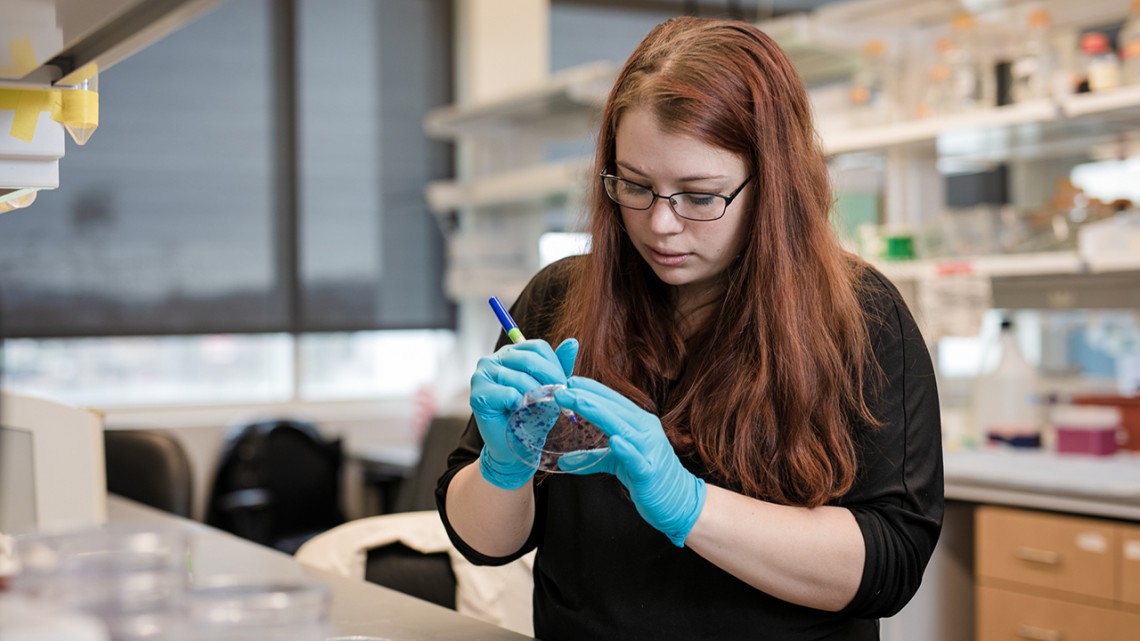
Jennie Sims researches cell behavior in the lab of associate professor Marcus Smolka.
Mann award winner probes cell behavior
By Krisy Gashler
When the DNA in a cell breaks, the cell has two options for repairing itself: It can either chunk the two broken ends back together in a kind of quick, jury-rigged process, or it can grab another DNA molecule and use it as a proofreader to slowly copy the entire strand of DNA.
Understanding why, how and when cells choose one or the other of these pathways has crucial implications for fighting cancer. Jennie Sims, the recipient of the 2019 Harry and Samuel Mann Outstanding Graduate Student Award, is making progress on all of those questions.
Sims is a fifth-year graduate student in the lab of Marcus Smolka, associate professor in the Department of Molecular Biology and Genetics.
“Understanding how cancer cells repair DNA breaks is really important because cancer cells use a lot of these and grow really, really fast,” Sims said. “If we can understand how cancer cells are manipulating the normal DNA repair pathways, we might be able to interrupt them or nudge them in a different direction.”
Sims’ work focuses on TOPBP1, a protein that acts as a scaffold to stabilize other proteins that do the actual DNA repair. Whether a cell decides to join the ends of broken strands of DNA – the jury-rigging approach – or do the copying approach, called homologous recombination, TOPBP1 is the facilitator.
“TOPBP1 is acting like a molecular switch – like a railroad switch, left or right,” Sims said. “By making small tweaks in TOPBP1, we can actually lock the switch, or force it to make the decision we want. If we can understand the pathway and manipulate it, it might become helpful for clinicians treating cancer patients.”
To explore the idea, Sims created genome-edited mice using Cornell’s state-of-the-art CRISPR-Cas9 system, which is “like using tiny, molecular scissors,” she said. After creating very specific, amino acid changes to TOPBP1, she injected the DNA into mouse embryos and then implanted the embryos in other mice.
Sims created two mutations, both to TOPBP1. One set of mice was given a mutation that reduces its ability to use the fast but error-prone end-joining method, making it so that most DNA repairs must be done the slow, careful way. Another group of mice was given the opposite mutation: They can only repair the DNA by using the quick, end-joining process.
The results so far have been fascinating and illuminating in their implications for cancer and, potentially, for fertility.
As Sims expected, the mice that overuse end joining show signs of DNA damage sooner. They get sicker and develop bits of broken DNA in their blood, which is a sign of trouble ahead.
The slow-and-careful-repair mice survive well under stress and appear more resistant to DNA damage, but, unexpectedly, initial results suggest that they also suffer decreased fertility. Under a lifetime with this switch locked, the mice may also become predisposed to cancer because if a cell chooses the wrong DNA to copy, it can rewrite an entire chromosome.
Smolka, Sims’ adviser, praised her leadership, work ethic and communication skills.
“The combination of Jennie’s expertise is quite unique and puts her in an excellent position to uncover novel, interesting biology in the field of genome maintenance,” Smolka wrote in a recommendation letter. “I consider her as one of the most brilliant and astute graduate students I have met in my career.”
The Harry and Samuel Mann Outstanding Graduate Student Award was established in 2012 by Thomas Mann ’64 and Diann Mann ’66, and Cornell parents Jeanne (Mann) Newman and Gary Newman. The annual $20,000 award honors Harry and Samuel Mann – the children of Russian immigrants and some of the earliest commercial suppliers of biochemicals for life science research – by recognizing the next generation of biochemical, molecular and cell biologists.
“This work is fascinating,” said Thomas Mann, Samuel’s son. “Generations of the Mann family hope that it, as well as the endeavors of all Cornell life science research, will bring benefit to a wide spectrum of people in our world.”
Krisy Gashler is a freelance writer for the College of Agriculture and Life Sciences.
Media Contact
Get Cornell news delivered right to your inbox.
Subscribe
